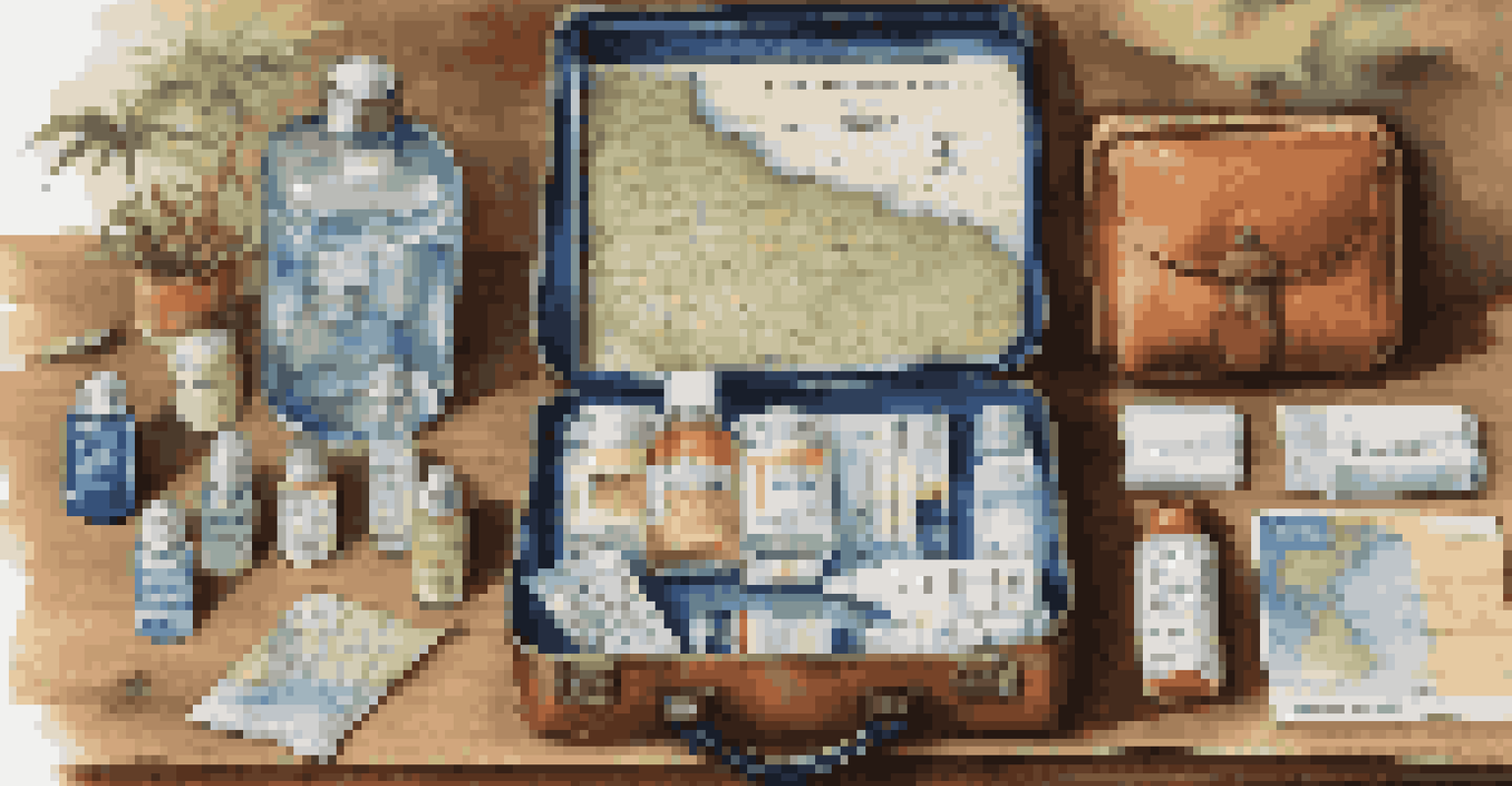How to Deal with Foodborne Illness While Traveling

Understanding Foodborne Illness: What You Need to Know
Foodborne illness, often referred to as food poisoning, occurs when you consume contaminated food or drinks. It's essential to understand that symptoms can range from mild discomfort to severe illness, depending on the cause. Common culprits include bacteria, viruses, and parasites that thrive in unsanitary conditions.
Health is a relationship between you and your body.
When traveling, you're often exposed to different foods and hygiene standards, making it crucial to be vigilant. For instance, street food can be delicious but poses a higher risk if not prepared properly. Recognizing the signs of foodborne illness can help you act quickly if you or someone you’re traveling with starts feeling unwell.
Being informed about foodborne illness can empower you to make safer food choices while exploring new cuisines. Knowledge is your first line of defense, so familiarize yourself with common symptoms and preventive measures before your next adventure.
Pre-Travel Preparations: Pack Smart and Stay Informed
Before you embark on your journey, take the time to research the food safety standards of your destination. Some countries may have stricter regulations than others, so knowing what to expect can guide your choices. Additionally, packing a small travel health kit with essentials like hand sanitizer and antacids can be a lifesaver.

Consider bringing snacks that are less likely to spoil, such as granola bars or dried fruits, especially if you're traveling to remote areas where food options may be limited. This way, you'll have safe, familiar food on hand to help reduce your chances of encountering foodborne illness.
Stay Informed About Food Safety
Researching food safety standards at your destination and understanding local practices can help you make safer dining choices while traveling.
Lastly, don’t forget to consult your healthcare provider for any travel-specific vaccinations or medications that may be necessary. A little preparation can go a long way in ensuring you stay healthy during your travels.
Choosing Safe Foods: What to Look For While Dining Out
When you're out exploring, it's important to be mindful of the foods you choose. Opt for freshly prepared meals, as these are less likely to harbor harmful bacteria. For example, dishes that are cooked to order, like grilled meats or stir-fried vegetables, are generally safer than pre-prepared options sitting out for long periods.
Travel is fatal to prejudice, bigotry, and narrow-mindedness.
Additionally, steer clear of buffet-style dining unless you can visibly ensure the food is being kept at safe temperatures. Buffets can be a breeding ground for bacteria if food isn’t replenished regularly or kept warm enough. Trust your instincts—if something looks or smells off, it’s best to skip it.
Also, don't hesitate to ask questions about food preparation and ingredients. A reputable restaurant will be happy to provide this information, helping you make informed choices that protect your health while you enjoy local flavors.
Staying Hydrated: Drink Smart to Avoid Illness
Staying hydrated is crucial, especially while traveling. However, water safety can vary greatly from one location to another. In many places, tap water may not be safe to drink, so always opt for bottled water or beverages that have been boiled or treated.
Be cautious with ice, as it may be made from contaminated water. When in doubt, skip the ice in your drinks, especially in street-side cafes or unfamiliar establishments. Choosing sealed beverages can significantly reduce your risk of encountering waterborne illnesses.
Recognize Foodborne Illness Symptoms
Being aware of symptoms like nausea and diarrhea is crucial for prompt treatment and seeking medical help when necessary.
Lastly, be mindful of how you clean your fruits and vegetables. If you're eating fresh produce, consider peeling it or rinsing it with bottled water to further minimize the risk of contamination. Staying hydrated without compromising your health is absolutely achievable with a little extra care.
Recognizing Symptoms: When to Seek Help
Understanding the symptoms of foodborne illness is vital for prompt treatment. Common signs include nausea, vomiting, diarrhea, abdominal cramps, and fever. If you notice any of these symptoms shortly after eating, it's essential to take action quickly.
While many cases resolve on their own, severe symptoms, such as persistent vomiting, dehydration, or high fever, warrant immediate medical attention. Don’t hesitate to seek help, especially in a foreign country where access to healthcare may differ from what you’re used to.
Having a plan for accessing medical care while traveling can ease your mind. Research local hospitals or clinics in advance, and keep emergency numbers handy. Being prepared can ensure you get the help you need without unnecessary delays.
Treatment Options: How to Care for Yourself on the Go
If you find yourself dealing with foodborne illness during your travels, there are several steps you can take to feel better. Start by staying hydrated with clear fluids like water or electrolyte solutions to replace lost fluids. Avoid solid foods until your stomach settles.
Over-the-counter medications, such as anti-nausea or anti-diarrheal drugs, can help manage symptoms. However, it's important to listen to your body—sometimes, it's best to let your system clear out the offending food naturally.
Invest in Travel Insurance
Travel insurance provides a safety net for medical expenses related to foodborne illness, ensuring you can focus on enjoying your trip.
If symptoms persist or worsen, don't hesitate to seek medical attention. Many countries have pharmacies where you can get advice or medications to help you recover. Remember, taking care of your health is the priority, so be proactive about seeking help when needed.
Travel Insurance: A Safety Net for Health Concerns
Investing in travel insurance is one of the smartest decisions you can make before heading out on your trip. A good travel insurance policy can cover medical expenses related to foodborne illness, ensuring you won’t face hefty bills if you need treatment abroad. It's a small price to pay for peace of mind.
When choosing a policy, look for one that includes emergency medical coverage and trip cancellation benefits. This way, if you fall ill and need to change your travel plans, you're protected. Read the fine print and ensure it covers foodborne illnesses specifically, as policies can vary.

Ultimately, travel insurance offers a safety net that allows you to explore with confidence. Knowing you have support in case of health issues can help you focus on creating amazing memories rather than worrying about what might go wrong.
Traveling Mindfully: Embrace Safety Without Stress
Traveling should be an enjoyable experience, not one filled with anxiety about food safety. By adopting a mindful approach to eating and drinking, you can significantly reduce your risk of foodborne illness while still indulging in local flavors. Take time to observe how food is prepared and served.
Being proactive is key—research, prepare, and make informed choices about what you consume. Embrace the adventure of trying new dishes while keeping your health in mind. After all, part of the joy of traveling is experiencing different cultures through their food.
Remember that most travelers enjoy their trips without issues, so don’t let fear overshadow your adventures. With the right precautions and a positive mindset, you can savor every moment of your travels, delicious food included.